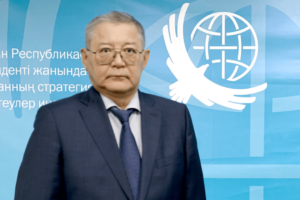ASTANA – German Federal Chancellor Olaf Scholz will pay an official visit to Kazakhstan on Sept. 16-17. During his visit, Scholz will meet with President Kassym-Jomart Tokayev and participate in the second meeting in the Central Asia + Germany format.

Yerbulat Seilekhanov, Chief Researcher at the Kazakhstan Institute for Strategic Studies. Photo credit: kisi.kz
Yerbulat Seilekhanov, the chief researcher at the Kazakhstan Institute for Strategic Studies (KazISS), outlined key topics on the agenda and what to expect from the visit in a recent article.
Trade and investment highlights
Germany is a key strategic partner for Kazakhstan in Europe, with both countries sharing growing economic cooperation, strong political ties, and close collaboration on environmental and humanitarian issues, including through international organizations.
Bilateral relations have shown significant growth in trade, economic, and investment sectors. In 2023, trade turnover between Kazakhstan and Germany reached $3.9 billion, a 41% increase from 2022. Kazakhstan’s exports to Germany rose 3.1 times to $742.3 million, with oil and petroleum products, coal, ferroalloys, phosphorus, fish filets, and aircraft making up the majority.
Imports from Germany to Kazakhstan grew by 41.2%, totaling $3.1 billion, with pharmaceuticals, medical equipment, automobiles, agricultural machinery, and other industrial goods dominating the list. Kazakhstan accounts for 83% of Germany’s total trade with Central Asia.
Among the largest investment projects is a $50 billion green hydrogen production cluster in the Mangystau Region, led by the German-Swedish company Svevind. Another notable project is the construction of a $500 million lithium production plant in East Kazakhstan by Bergbau AG.
In 2023, Germany included Kazakhstan in a list of 34 countries eligible for preferential investment guarantees.
Key agenda issues
“New trade, economic, and investment agreements are expected during negotiations in the Kazakh capital,” said Seilekhanov.
According to Steffen Hebestreit, a German government spokesperson, talks will focus on cooperation in science, economics, energy, communications, and raw materials.
With Kazakhstan producing 19 of the 34 materials critical to the European Union’s economy, discussions on critical material supply are likely. New projects in agriculture, chemistry, and engineering are also expected.
Seilekhanov noted that the prospects of the Trans-Caspian International Transport Route, a key communication project linking West-East, will be a constant topic in Kazakhstan’s discussions with European partners, including Germany.
Politically, the visit will likely include discussions on domestic issues in both countries, set against Kazakhstan’s democratic reforms and Germany’s post-election situation.
Seilekhanov emphasized that the talks might also cover efforts to accelerate the peace process in Ukraine and the Middle East, with Kazakhstan and Germany exploring mediation opportunities. The positions of both countries regarding the upcoming UN Summit of the Future, scheduled for the end of this month, are also likely to be discussed.
Kazakhstan is highly interested in Germany’s environmental initiatives, climate protection, and sustainable development. Berlin launched the Water Initiative for Central Asia in 2007, aimed at improving water resource management in the region. This has since evolved into the Green Central Asia initiative, launched in 2019, which promotes cooperation among the five Central Asian states on ecological and sustainable development issues with German support.
Strengthening regional partnerships
Astana will be the first Central Asian capital to host a summit of this format, highlighting Kazakhstan’s leading role in regional cooperation with external partners.
“For Germany and the EU, Central Asia is seen as a single “organism,” rich in raw materials, human potential, transit and transport opportunities, and a growing economic market with attractive trade offers,” said Seilekhanov.
He noted that the increase in contacts between Germany, Kazakhstan, and other Central Asian countries is a sign of this strategic interest.
In 2023, high-level visits were exchanged between Kazakhstan and Germany. In June, German President Frank-Walter Steinmeier visited Kazakhstan and the Kyrgyz Republic, while the Kazakh leader visited Germany twice—in September for the first Central Asia + Germany meeting in Berlin, and in November for an official visit. That same year, President of Uzbekistan Shavkat Mirziyoyev visited Germany twice, and Chancellor Scholz will visit Tashkent on Sept. 15 before arriving in Astana. The heads of the Kyrgyz Republic and Tajikistan also participated in last year’s Berlin summit.
“The upcoming visit by Chancellor Scholz to Astana will provide fresh momentum to Kazakh-German relations and elevate cooperation between Central Asia and Germany to a new level,” said Seilekhanov.
